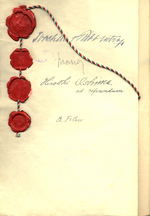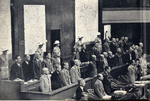Hiroshi Oshima
| Surname | Oshima |
| Given Name | Hiroshi |
| Born | 19 Apr 1886 |
| Died | 6 Jun 1975 |
| Country | Japan |
| Category | Government |
| Gender | Male |
Contributor: C. Peter Chen
ww2dbaseHiroshi Oshima was born in Gifu Prefecture, Japan to one-time Minister of War Kenichi Oshima. He attended the Japanese Army Academy and completed his studies in 1906. In 1915, he completed courses at the Army War College. Between 1923 and 1924, he was a military attaché in Budapest, Hungary and Vienna, Austria. Between 1930 and 1931, he was the commanding officer of the 10th Field Artillery Regiment.
ww2dbaseIn 1934, Oshima became a military attaché in Berlin, Germany at the rank of colonel. He befriended Joachim von Ribbentrop and met Adolf Hitler in the fall of 1935. By 1938, his close working relationship with top Nazi German officials landed him the position of ambassador and the rank of lieutenant general. In this capacity, he was instrumental in the forging and signing of the Anti-Comintern Pact on 25 Nov 1936 and the Tripartite Pact on 27 Sep 1940.
ww2dbaseBetween 1939 and 1940, Oshima returned to Japan, but was sent back to Germany in early 1941 at the insistence of the German government. In late 1941, he received the Grand Cross of the Order of the German Eagle in Gold from Hitler. Becoming more and more of a confidante to Hitler, he received privileged information about German military deployments, and was given full access to tour front areas such as the Atlantic Wall and the Russian front. He regularly reported back to Tokyo, Japan regarding what he had learned. Unknowingly, he allowed the Americans to benefit from his detailed reports, as by 1940 the Americans had already broken the Japanese diplomatic code. Nearly all of his hundreds of dispatches sent between 1941 and 1945 were intercepted by the Americans, providing the Western Allies most valuable intelligence. For example, Oshima's messages in early 1944 regarding Japan's intelligence network in Spain and the implicit Spanish cooperation led to the American decision to stop supplying the neutral country of Spain petroleum products. Later that year, his detailed report of German troop deployments, defensive armaments, and mobile reserves on the French coast was intercepted by the Allies and it greatly assisted the planning and execution of the Normandy invasion. American General George Marshall later noted Oshima as "our main basis of information regarding Hitler's intentions in Europe". The fact that the Allies were monitoring his diplomatic transmissions was not made known until after Oshima's death in 1975.
ww2dbaseOn 13 Apr 1945, Oshima met with Ribbentrop for the last time. He never thought that Germany would actually lose the war despite the rapidly approaching Allied forces. He promised Ribbentrop that he would make the last stand along with the leaders of Germany. It was one of many examples of him being an ardent supporter of Nazi Germany; he was so much so that in The Rise and Fall of the Third Reich author William Shirer said Oshima was "more Nazi than the Nazis". Nevertheless, like all diplomats present in Berlin, he was ordered to evacuate later on that same day he met with Ribbentrop. The Japanese diplomatic staff evacuated to Bad Gastein, Austria, a mountain resort on 14 Apr. The staff was detained by the Americans after the German surrender and was interrogated in a resort hotel in Pennsylvania, United States.
ww2dbaseOshima was arrested in Japan on 16 Dec 1945 for war crimes. He was found guilty by the International Military Tribunal for conspiring to wage aggressive war on 12 Nov 1948. He served his life sentence until late 1955 when he was paroled, and in 1958 he was granted clemency. He passed away in 1975 in Tokyo, Japan.
ww2dbaseSource: Wikipedia.
Last Major Revision: Sep 2008
Hiroshi Oshima Interactive Map
Photographs
 |  |
Hiroshi Oshima Timeline
| 19 Apr 1886 | Hiroshi Oshima was born. |
| 23 Feb 1941 | Joachim von Ribbentrop hosted Hiroshi Oshima in his home in Germany, where Ribbentrop attempted to persuade the Japanese ambassador that it was the time for Japan to strike British territories in Asia. Ribbentrop argued that there was little worry regarding the United States as American possessions in Asia could be bypassed easily, but should the Americans decide to go to war, the Japanese Navy was vastly superior to the US Navy. |
| 29 Nov 1941 | Japanese ambassador in Germany Hiroshi Oshima reported that, on the previous day, Joachim von Ribbentrop had verbally promised a German declaration of war on the United States should Japan and the US enter a state of war. |
| 30 Nov 1941 | The Japanese ambassador in Germany Hiroshi Oshima was informed by his superiors that war with the United States was near, and he was to inform Adolf Hitler and Joachim von Ribbentrop of such news. |
| 1 Dec 1941 | The Japanese ambassador in Germany Hiroshi Oshima was ordered to secure Joachim von Ribbentrop's signature on a document which stated that Germany would declare war on the United States should Japan and US enter a state of war. |
| 6 Dec 1941 | Japanese Foreign Minister Shigenori Togo ordered Ambassador Hiroshi Oshima to continue to press Germany to formally agree to declare war on the United States should Japan and US enter a state of war. Oshima was also ordered to avoid any German demands on a Japanese-Soviet war. |
| 8 Dec 1941 | Japanese ambassador in Germany Hiroshi Oshima sent a note to Joachim von Ribbentrop, requesting Germany to declare war on the United States. |
| 14 Dec 1941 | Hiroshi Oshima was awarded the German medal Order of the German Eagle 1st Class. |
| 6 Jul 1944 | Baron Hiroshi Oshima, the Japanese ambassador to Berlin, unaware that his reports were being read by the cryptanalysts in Bletchley Park in Britain, told Tokyo that the German high command was still awaiting for George Patton's army group to land in the Pas de Calais, France. A month after D-Day the "Fortitude" deception plan was still misleading the German generals. |
| 6 Jun 1975 | Hiroshi Oshima passed away. |
Você gostou deste artigo ou achou este artigo útil? Se sim, considere nos apoiar no Patreon. Mesmo USD $1 por mês já vai longe! Obrigado. Por favor, ajude-nos a espalhar a palavra: Fique atualizado com WW2DB: |
Visitor Submitted Comments
7 Jul 2019 10:24:57 PM
My grandmother worked as a cook at Bedford Springs Hotel and became engaged to a member of the Japanese embassy staff interned there. I am hoping to connect with his family or children as I am writing my doctoral dissertation on the hotel.
All visitor submitted comments are opinions of those making the submissions and do not reflect views of WW2DB.

» Anti-Comintern Pact
» Tokyo Trial and Other Trials Against Japan
- » 1,171 biographies
- » 337 events
- » 44,911 timeline entries
- » 1,245 ships
- » 350 aircraft models
- » 207 vehicle models
- » 376 weapon models
- » 123 historical documents
- » 261 facilities
- » 470 book reviews
- » 28,523 photos
- » 365 maps
Lt. Gen. Lewis B. "Chesty" Puller, at Guadalcanal
Por favor, considere nos apoiar no Patreon. Mesmo R$1 por mês já faz uma grande diferença. Obrigado!
Ou, por favor, nos apoie adquirindo alguns produtos do WW2DB na TeeSpring. Obrigado!
7 Mar 2014 09:38:17 AM
I was one of the children interned at Bedford Springs and I would like to find pictures of ourselves. I found some but I know there are more. My mother was French and my father Japanese. I was also in Bruckenberg, Silesia and Bad Gastein, Austria (when General Maxwell Taylor) came in. Can you help?